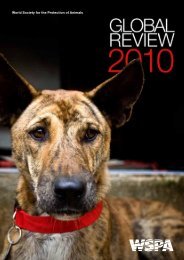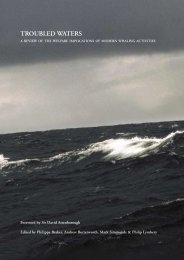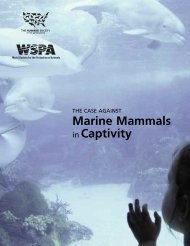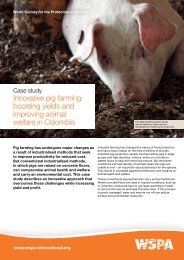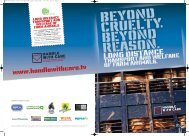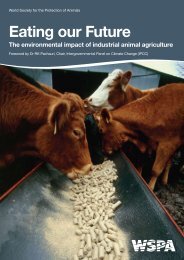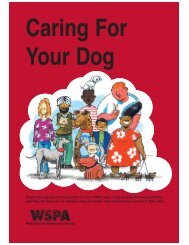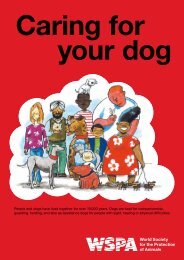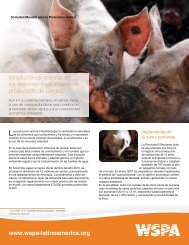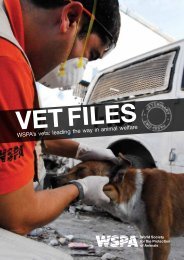Proceedings of the Untangled symposium: - WSPA
Proceedings of the Untangled symposium: - WSPA
Proceedings of the Untangled symposium: - WSPA
Create successful ePaper yourself
Turn your PDF publications into a flip-book with our unique Google optimized e-Paper software.
Table 1Communication exercise – key messagesand target audiencesPriority problem Stakeholder Key messages to communicate Method/s Actions to ask <strong>the</strong>m to takeSingle-use carrier bags (whe<strong>the</strong>rintentionally or accidentlyimproperly disposed <strong>of</strong> byconsumers) enter <strong>the</strong> waterwaysand oceans where <strong>the</strong>y areingested by marine mammalsand turtles, causing gut blockageand internal complicationsresulting in decreased health <strong>of</strong><strong>the</strong> animal and/or deathPlastic packing bands usedby industry that enter <strong>the</strong>marine ecosystem and threatento entangle marine animalsincluding pinnipeds, cetaceans,turtles and large fishA lack <strong>of</strong> capacity in terms <strong>of</strong>training, infrastructure, respondernetworks and monitoring in <strong>the</strong>rescue community is hamperinganimal welfare effortsA lack <strong>of</strong> adequate protocolinfrastructure and knowledgeto enable fishermen, coastalcommunities, workers ando<strong>the</strong>r ocean users to tell <strong>the</strong>people equipped to take actionabout an entangled animalrequiring rescueA ten-yearoldPlasticindustryThegovernment<strong>of</strong>ficialConsumerGarbage in <strong>the</strong> oceans killsmillions <strong>of</strong> animals. The numberone item is plastic bags. Yourparents use plastic bags – this iskilling turtlesAre you aware <strong>of</strong> <strong>the</strong> problem?Are <strong>the</strong>re any advancesin technology to minimise<strong>the</strong> problem?Ensure that <strong>the</strong> problemstatement is stated at‘consumer level’The economic impact,e.g. tourismNegative impact for human/animal lifeMarine animals becomeentangled in debris and fishinggear and people that find <strong>the</strong>mdo not know what to do/ whoto informIn some places <strong>the</strong>re is no oneto call even though <strong>the</strong>re arean increasing number <strong>of</strong> rescuegroups around <strong>the</strong> worldThere needs to be more publicityabout problems and solutionsFace-to-faceconversationsEstablishingconstructivedialogue andrelationshipProtocols/facts/statisticsCase studieson <strong>the</strong> negativeimpactsCreate socialmedia network(Twitter,Facebook etc.)to inform public• It is really easy to fix this:Just say no! (in <strong>the</strong> shop)• Plastic bags become futuregarbage – let’s stop thistoge<strong>the</strong>r• Find out whe<strong>the</strong>r <strong>the</strong> industrybelieves any <strong>of</strong> <strong>the</strong> potentialsuggested solutions are viable• Find out what <strong>the</strong> barriers areto overcome from <strong>the</strong> industryperspective• Establish whe<strong>the</strong>r <strong>the</strong>company would be interestedin participating in extendedproducer responsibility• Set regulations• Set <strong>the</strong> local protocols• Organise <strong>the</strong> strandingnetworks• Funding <strong>the</strong> preventativeprogrammes• Establish a select committee• Benchmarks to highlightsuccess• Local participation andawarenessYou can help by finding out whatis being done locally and who isin chargeHuman safetyMarine animal rescues canbe complicated by a lack<strong>of</strong> efficient, appropriateand effective governmentengagements (regulation/legislation etc.)Thegovernment<strong>of</strong>ficialProvide solutionsto <strong>the</strong> problemsPlan programmesfor <strong>the</strong>m• Protocol/monitoring• Facilities• Enforcement agencies• Training and capacity-building• Institutional legislature24



